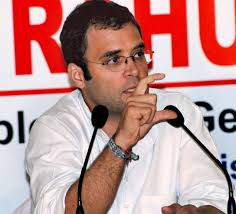
Gandhi, who was asked to reply to the EC notice by 11.30 AM today, said in his communication to Chief Election Commissioner VS Sampath that he wanted more time to respond since there were holidays due to the festive season.
He said he had received the EC notice only at 9.30 PM on October 31 and hardly had time to consult his lawyers on the issue.
The Congress leader also cited prior travel commitments for not responding the notice within the stipulted time.
EC sources said the Commission is considering Gandhi's communication.
The EC had issued a notice to Gandhi for his speeches in which he had said Pakistan's ISI was in touch with Muzaffarnagar riot victims and charged BJP with indulging in politics of hatred.
The Commission, after examining Gandhi's speeches made in Churu, Rajasthan, on October 23 and in Indore, Madhya Pradesh, on October 24 and after taking into account the electoral officer's report, had asked him to explain by Monday why action should not be initiated against him for prima facie violating the Model Code of Conduct.
"The Commission is prima facie of the view that your aforesaid speeches are violative of above-referred sub paras (1), (2) and (3) of Para 1 of the Model Code of Conduct for political parties and candidates," the EC notice served on him had said.
Rajasthan and Madhya Pradesh are among five states which go to Assembly polls in November-December this year.
The Commission has said that in case no reply is received within the prescribed time limit, it will be presumed that he has nothing to say and it will proceed to take appropriate action without any further reference.
The model code prescribes that "no party or candidate shall indulge in any activity which may aggravate existing differences or create mutual hatred or cause tension between different castes and communities, religious or linguistic".
It also states that "criticism of other political parties...based on unverified allegations or distortion shall be avoided" and that "there shall be no appeal to caste or communal feelings for securing votes".
BJP had complained to the Commission seeking action against Gandhi for allegedly violating the code of conduct by appealing for votes on communal lines and inciting hatred among different communities.
The opposition party had handed over a memorandum to Chief Election Commissioner, seeking withdrawal of recognition given to Congress as a national party and also demanding action against the party's Vice President for violating the code.
Citing excerpts from Gandhi's speech made in Churu in Rajasthan last week, BJP had said its tone and tenor was to incite communal hatred and tension between Hindus-Sikhs and Hindus-Muslims and make an appeal for votes in favour of Congress on the basis of communal sentiments.
In Indore, Gandhi had, in his speech, claimed that intelligence agencies in Pakistan were approaching some victims of Muzaffarnagar riots to lure them to terrorism.
"BJP felt that unless there is a Hindu versus Muslim situation in Uttar Pradesh, they would not do well. So, they set this fire," Gandhi had alleged, adding it was Congress which had "doused the fire".
Gandhi had claimed the intelligence official told him he was convincing the youngsters to stay away from the influence of Pakistani operatives.
"They (BJP) have set this fire, now who will douse it? Wherever they go, they set this fire thinking they will benefit in the elections. But they don't see that it damages the country," the Congress leader had said.
In a sharp attack on BJP at a series of rallies in Churu and Alwar in Rajasthan, Rahul had alleged its "politics of anger and hate" was fanning communal tensions and damaging the country's secular fabric.
"I was seeing my face in their grief. That is why I am against their (BJP's) politics....What do they do. They will put Muzaffarnagar on fire, Gujarat on fire, UP on fire and Kashmir on fire and then you and we will have to douse that. This damages the country," he had said.








Comments
Add new comment